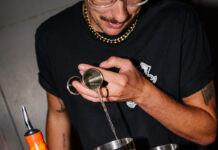Bad pints will not be accepted in bars so cellars need to give pubs the best start

IT’S fair to say that many customers don’t appreciate all the aspects that both brewers and bars have to get right in order to deliver quality draught beer.
But with consumers expecting perfect pints from pubs every time, licensees can’t afford to neglect their end of the deal as arguably nothing will lose a bar business faster than a bad pint.
Therefore it’s of the utmost importance that staff in the on-trade are trained to look after the cellar and its contents properly, firms told SLTN.
“It is vitally important that people are made aware how important the cellar is,” said Dougie Stoddart, commercial director at Hubbard Products.
“The cellar is the hub of the pub and should be treated accordingly.
“Most pubs have a CCTV system, and camera positioned to record transactions at tills to eliminate theft, however, many licensees do not take the same approach to their most valuable liquid asset.
“Training is essential and the person responsible for the cellar should bring new bar staff in to show them every aspect of the cellar for health and safety compliance.
“This should cover hygiene, stock rotation and control, and checking the temperature of the cellar.”
Richard Cooper at beer line cleaning firm Clear Brew Glasgow North, reinforced that view and urged operators not to cut costs when it comes to the cellar.
He said: “The main problems in the cellar are staff not being properly trained to change gas, kegs and casks, not maintaining good hygiene and safety in the cellar and cooling issues, which includes landlords turning off air conditioners to save money.
“These can all be avoided by proper training and communication as well as avoiding false economies when trying to save money.
Good training, routines and pre-emptive maintenance is always a good thing.
“At the end of the day, customers are paying for good beer and anything which damages your reputation has to be bad for business.
“Save money elsewhere and put the effort in where it counts.”
And the old adage ‘prevention is better than cure’ is particularly true in the cellar, reckons Cooper, as he advised bar staff to keep on top of the workload beneath the bar.
“Good training, routines and pre-emptive maintenance is always a good thing,” he said.
“So make sure you have a routine, eg. a set day for beer line cleaning and general cellar management tasks – make sure this is scheduled and not just ‘when we get the chance’.
“These are critical tasks and letting them slip can be costly, both in terms of time you won’t have on a busy night and in terms of wastage from poorly maintained products.”
As part of an enlarging general interest in the variety of beer styles on the market, there has been a renaissance in cask ale sales in the on-trade and Jerry Shedden, category and trade marketing director at Heineken, said that pubs aiming to capitalise on cask means cellar care is paramount.
He said: “With sales of cask ale in particular on the increase, the latest generation of beer drinkers expects a great, well-kept pint, in the right glassware, carefully presented by knowledgeable bar staff who can tell the story behind the drink.
“This means high standards of cellar maintenance are invaluable if outlets are to maximise the possibilities from the sale of cask beer.”
And with safety another vital factor in the cellar, a spokeswoman for Air Products said licensees have to pay heed to gas issues.
She said: “Regulators, pressure systems and safety relief valves need to be evaluated periodically and proper ventilation is a must when using gases.
“Is there a safe site for the storage of the gas cylinders or tank? Are your staff adequately trained in cellar safety, and the importance of ventilation and monitoring?”




















